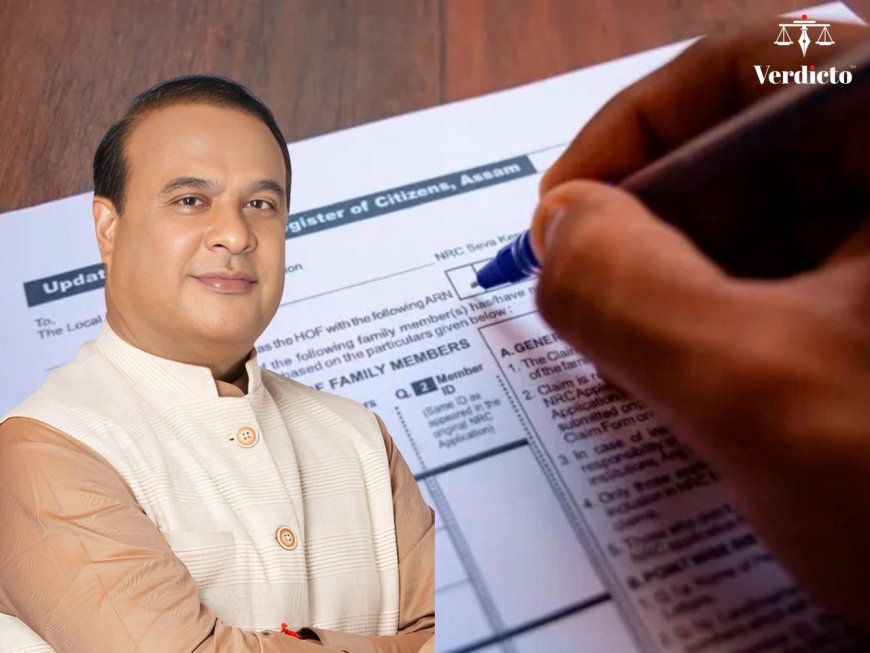Assam CM Questions Validity of NRC, Reaffirms Pushback Policy for Suspected Foreigners
Assam Chief Minister Himanta Biswa Sarma has once again stirred debate over the National Register of Citizens (NRC), asserting that the presence of a name in the NRC cannot be the sole determinant of Indian citizenship.

What the CM Said
Speaking at a public event in Darrang district on Wednesday, Sarma stated that the Assam government's current policy is to "push back" suspected foreigners, even if they are listed in the NRC. He said: “Many people had entered their names in the NRC by using unfair means. So we have adopted the policy of pushing back (foreigners) if the authorities are absolutely convinced that the persons concerned are foreigners.”
The CM’s remarks come amid reports that several individuals have been picked up across Assam in the past month on suspicion of being “doubtful citizens” as part of a nationwide crackdown. Many were allegedly deported to Bangladesh—some reportedly returned after Dhaka refused to recognize them as its citizens.
Sarma expressed serious doubts about the way the NRC was prepared and said he does not believe its inclusion should automatically exempt someone from being classified as an illegal migrant:
“Personally, I am not convinced that the presence of a name in the NRC alone is enough to determine that someone is not an illegal migrant.” He also hinted at possible lapses by officials during the NRC process and made serious allegations against social activist Harsh Mander, accusing him of influencing the process.
What is the NRC?
The National Register of Citizens (NRC) is an official record of individuals recognized as Indian citizens in Assam. It was introduced with the aim of identifying illegal immigrants in the state, especially those who might have entered from Bangladesh after 1971. The exercise was carried out under the supervision of the Supreme Court of India and culminated in the final list published on August 31, 2019.
The final NRC excluded over 19 lakh applicants—nearly 6% of Assam's population. However, it has not been notified by the Registrar General of India (RGI), making its legal and administrative status unclear to date.
Why is NRC in the News Again?
The Assam government's decision to ignore NRC listings and proceed with deportations highlights the policy contradiction between state and central authorities. CM Sarma announced that Assam would now invoke the Immigrants (Expulsion from Assam) Act, 1950, which empowers district commissioners to declare individuals as illegal immigrants and evict them. This marks a shift from relying on judicial mechanisms to more administrative actions.
Legal and Human Rights Concerns
Critics argue that the non-notification of NRC leaves 19 lakh people in legal limbo, vulnerable to detention, deportation, or being labelled "doubtful voters." Moreover, lack of legal clarity on what constitutes conclusive proof of citizenship complicates matters for those affected.
The CM’s allegations against Harsh Mander, a prominent human rights defender, further indicate how the NRC issue continues to be politically and ideologically charged. Mander has denied previous claims of manipulating the process and has called for humanitarian approaches to citizenship and migration issues.
What’s Next?
The current developments raise multiple legal questions:
Can a state override a Supreme Court-supervised process like the NRC?
Does administrative action under the 1950 Act violate fundamental rights or due process?
What happens to those excluded from NRC but not accepted by Bangladesh?
These issues are likely to face judicial scrutiny in the months to come, as legal activists and affected citizens challenge arbitrary detentions and deportations.
Verdicto will continue tracking the legal and human implications of Assam’s evolving citizenship policy. For ground reports, legal explainers, and expert opinions—stay tuned.
Disclaimer: The views and data expressed in this article are solely those of the writer. Verdicto is not responsible for the accuracy or legality of the content. Any concerns should be directed to the author.







